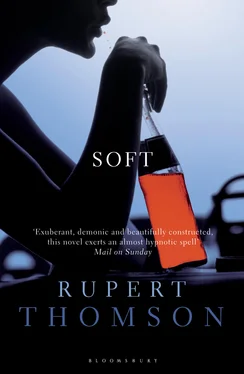A scornful noise came out of him, half grunt, half chuckle. He didn’t know what Charlton had ever done, but he knew what he himself had done, sometimes for money, sometimes for the joy of it, the buzz. He used to have a temper. A short fuse. Someone only had to look at him the wrong way, or look at him too long, and he was in there with his forehead, his boots, the bottle he was drinking from. The worst thing he ever did? One night, in Stonehouse, he looked up to see George Catt’s face floating towards him through a fog of cigarette smoke. The sagging, bloodhound slant of Catt’s eyelids. Almost as if he’d had a stroke. George Catt. Owner of the night-club where he worked, his boss. How would you like to earn yourself five hundred quid? When Barker asked him what he’d have to do, Catt tapped a cylinder of ash into an empty glass. ‘Knowles,’ he said. Knowles was Catt’s accountant. Young bloke, going bald. But cocky. There were rumours he’d been skimming. Catt pinched his pitted, pulpy nose between his fingers. ‘Do the knees.’ Catt nodded to himself. ‘You want someone healthy to look after your money, don’t you. Someone lucky. You don’t want some cripple.’ Two days later Barker and another man by the name of Gosling took Knowles to the basement of a derelict hospital. They hung him from the pipes on the ceiling, hung him upside-down, and then they beat him with chair-legs, not the rounded ones, the ones with edges. There were all the usual sounds, but what he remembered most was the drip of fluid down on to the concrete — blood and urine and saliva streaming past the accountant’s ears, which had turned bright-red, streaming through his last remaining wisps of hair. A right old cocktail on the floor. At one point Barker leaned over, turned his head the same way round as Knowles’s. It reminded him of a film he had seen once, a documentary about men in space, and how their tea had drifted out of their cups and up towards the ceiling …
Trees rushed in the wind. Trees rushing.
He shifted the sledgehammer from his right hand to his left. Knowles. Somehow, it surprised him that the memory was his, not someone else’s. Of course it was a long time ago, ten years at least — but still. He crossed the street and rang the top bell. Nobody answered. He rang again. At last a window screeched open on the third floor and a girl peered down. She asked him what he wanted. He gave her the bad news, showing her the piece of paper Charlton had handed him. She told him what he could do with his piece of paper, then she slammed the window shut with such force that fragments of white paint were shaken loose, came spinning through the air like snow. Barker stood back, took a breath. Then swung the sledgehammer at the door. The wood buckled almost instantly, splintering around the lock. One shoulder-charge and he was in. He climbed slowly to the third floor, his mind empty. He noticed the silence on the stairs, which was the silence of a Sunday morning.
The inside door was even flimsier — a piece of simple plywood, one Yale lock. He knocked. Voices murmured on the other side, but no one came. He knocked again, waited a few seconds, then aimed the sledgehammer at the lock and swung it hard. After just two blows, the door was hanging off its hinges. That was the thing about squatters. They couldn’t afford decent security. He heard a movement behind him and looked over his shoulder. A woman in a pale-pink quilted house-coat had appeared on the stairs below him, her eyes wide with shock, her mouth tight, as if elasticated. A neighbour, presumably.
‘It’s all right, love,’ he said. ‘Bailiff.’
When he shoved the door open, two girls were standing at the end of a corridor, their shoulders touching. The girl who’d sworn at him wore a long yellow T-shirt. It had a picture of Bob Marley on it. Her legs and feet were bare. The other girl had dyed her hair a dull green colour. He thought they must both be in their early twenties. A boy stood behind them, roughly the same age. They were all perfectly still, almost frozen, like a scene from that TV programme he used to watch as a child, what was it called, that’s right, The Magic Boomerang .
‘Get your stuff packed up,’ he said. ‘You’re moving out.’
The girl with the green hair started screaming at him, but he had learned, during his years as a bouncer, to turn the volume down on other people’s noise. He was only aware of a girl with her mouth open, her throat and forehead reddening, the veins pushing against the thin skin of her neck. Her hands were clenched at hip-level, the inside of her wrists turned towards him. She wasn’t holding a weapon. He walked past her, into the kitchen. Opened the fridge. Yoghurt, orange juice, half a tin of baked beans. He picked up a carton of milk and sniffed at it. Seemed fresh enough.
‘Whose side are you on?’ said the girl in the T-shirt.
Barker looked at her. ‘I used to listen to Bob Marley.’ He thought back to the early seventies. ‘“Crazy Baldheads”,’ he said, and laughed. He drained the carton of milk, crushed it and dropped it on the floor. Then glanced at his watch. Ten-forty-nine. ‘I’m going to be generous,’ he said. ‘I’m going to give you twenty minutes.’
Two faces stared at him blankly from the kitchen doorway. The girl with the green hair was probably still screaming in the corridor. He cleared his throat. His mouth tasted sour. Squatters’ milk.
‘You hear what I said? Twenty minutes.’
He opened the door to the small roof terrace and walked outside. A bleak day, mist softening the shapes of the trees. Not a bad view, though. His view now. Maybe he could buy one of those barbecue contraptions with spindly legs, the ones that look like spaceships. He could invite Charlton round for hamburgers. On summer evenings he could sit here with a cold beer, his feet propped on the railings, and look out over the backs of houses, the rows of narrow gardens. Standing with his hands in the pockets of his jacket and his feet apart, Barker began to sing ‘Hotel California’ under his breath. He had no idea why that particular song had come to mind — unless perhaps he’d heard it on the radio that morning while he was waiting for his saucepan of water to boil.
On a dark desert highway
Cool wind in your hair …
He had to hum the rest because he couldn’t remember the words. When he walked back inside, the squatters were huddled by the front door, their possessions crammed into two black bin-liners. Who would have thought it would be so easy? Charlton had offered him the use of a Rottweiler that morning, but he’d said no, and all the way over he’d been regretting it. Because he’d had no idea of what he might be up against.
He followed the squatters down the stairs, the words of the song coming back to him. Last thing I remember …
From the doorstep he watched them drift disconsolately away, three figures dissolving into the mist at the end of the street. It seemed unlikely they’d be back.
Upstairs again, on the third floor, he began to look around. In the two main rooms, the bedroom and the lounge, they’d left a lot of rubbish behind — silver take-away cartons, dirty clothing, cigarette butts, empty bottles. The ceiling in the kitchen looked as if it leaked, and the toilet wouldn’t flush at all. Otherwise, the flat was in reasonable condition. He took out the mobile Charlton had given him and dialled Charlton’s number. Standing in the middle of the room with the phone pressed to his ear, he had a flash of what it must be like to be Ray Peacock.
‘It’s me,’ he said when Charlton answered.
‘How did it go?’
‘All right.’ Barker moved to the window, the floorboards wincing under his weight. He peered up into the sky. Grey. All grey.
Читать дальше












